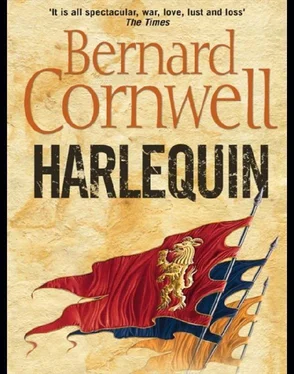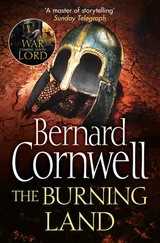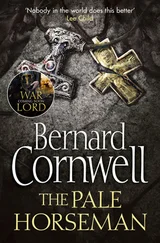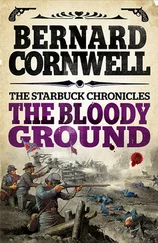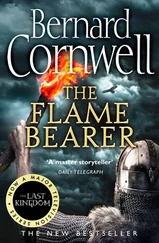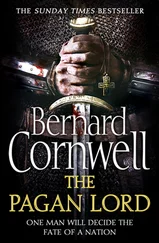The axemen broke through the iron-studded planks, lifted the bar and pulled the big gates open to reveal an empty street. A handcart with one broken wheel was abandoned on the cobbles, but no Frenchmen were visible. There was a pause as the archers stared in disbelief, then the shouting began. Havoc! Havoc!" The first thought was plunder, and men eagerly broke into the houses, but found little except chairs, tables and cupboards. Everything of real value, like every person in the city, was gone to the island. Still more archers were coming into the city. A few climbed towards the open ground surrounding the castle where two died from crossbow bolts spat from the high ramparts, but the rest spread through the city to find it bare, and so more and more men were drawn towards the bridge that spanned the River Odon and led to the Ile Saint Jean. At the bridge's southern end, where it reached the island, there was a barbican tower that was thick with crossbows, but the French did not want the English getting close to the barbican and so they had hastily thrown up a barricade on the bridge's northern side out of a great heap of wagons and furniture and they had garrisoned the barrier with a score of men-at-arms reinforced by as many crossbowmen. There was another bridge at the island's further side, but the archers did not know of its existence and, besides, it was a long way off and the barricaded bridge was the quickest route to the enemy's riches.
The first white-fledged arrows began to fly. Then came the harder sounds of the enemy's crossbows discharging and the crack of bolts striking the stones of the church beside the bridge. The first men died.
There were still no orders. No man of rank was inside the city yet, just a mass of archers as mindless as wolves smelling blood. They poured arrows at the barricade, forcing its defenders to crouch behind the overturned wagons, then the first group of English gave a cheer and charged at the barricade with swords, axes and spears. More men followed as the first tried to climb the ungainly pile. The crossbows banged from the barbican and men were thrown back by the heavy bolts. The French men-at-arms stood to repel the survivors and swords clashed on axes. Blood was slick on the bridge approach and one archer slipped and was trampled underfoot by his colleagues going to the fight. The English were howling, the French were shouting, a trumpet was calling from the barbican and every church bell on the Ile Saint Jean was tolling the alarm. Thomas, having no sword of his own, was standing in the porch of a church which stood hard beside the bridge from where he was shooting arrows up at the barbican tower, but his aim was obscured because a thatch in the old city was on fire and the smoke was curling over the river like a low cloud.
The French held all the advantages. Their crossbowmen could shoot from the barbican and from the shelter of the barricade, and to attack them the English had to funnel onto the narrow bridge approach, which was littered with bodies, blood and bolts. Still more enemy crossbowmen were stationed in the line of boats that was moored along the island's bank, stranded there by the falling tide, and the defenders of those boats, sheltered by the stout wooden gunwales, could shoot up at any archer foolish enough to show himself on those parts of the city wall that were not smoke-shrouded. More and more crossbowmen were coming to the bridge until it seemed as if the air above the river was as thick with quarrels as a flock of starlings.
Another rush of arch ers charged from the alleys to fill the narrow street leading to the barricade. They screamed as they charged. They were not fighting with their bows, but rather with axes, swords, billhooks and spears. The spears were mostly carried by the hobel-ars, many of them Welshmen who uttered a high-shrieked howl as they ran with the archers. A dozen of the new attackers must have fallen to crossbow bolts, but the survivors leaped the bodies and closed right up to the barricade that was now defended by at least thirty men-at-arms and as many crossbowmen. Thomas ran and picked up the arrow bag of a dead man. The attackers were crammed up against the arrow-stuck barricade with little room to wield their axes, swords and spears. The French men-at-arms stabbed with lances, hacked with swords and flailed with maces, and as the front rank of archers died, the next rank was pushed onto the enemy weapons, and all the time the crossbow quarrels thumped down from the barbican's crenellated tower and flew up from the grounded ships in the river. Thomas saw a man reeling from the bridge with a crossbow bolt buried in his helmet. Blood poured down his face as he made a strange incoherent mewing before falling to his knees and then, slowly, collapsing on the road where he was trampled by another rush of attackers. A few English archers found their way onto the roof of the church and they killed a half-dozen of the barricade's defenders before the crossbowmen on the barbican swept them away with stinging volleys. The bridge approach was thick with bodies now, so many corpses that they obstructed the charging English, and a half-dozen men began heaving the dead over the parapet. A tall archer, armed with a long-handled axe, managed to reach the barricade's summit, where he chopped the heavy blade again and again, beating down at a Frenchman who had ribbons on his helmet, but then he was struck by two crossbow bolts and he folded over, letting the axe fall and clutching at his belly, and the French hauled him down to their side of the barricade where three men hacked at him with swords, then used the archer's own axe to sever his head. They thrust the bloody trophy onto a spear and waved it above the barricade to taunt their attackers.
A mounted man-at-arms, wearing the Earl of Warwick's badge of a bear and ragged staff, shouted at the archers to retreat. The Earl himself was in the city now, sent by the King to pull his bowmen back from their unequal fight, but the archers were not willing to listen. The French were jeering them, killing them, but still the archers wanted to break through the bridge's defences and slake themselves on Caen's wealth. And so still more blood-maddened men charged at the barricade, so many that they filled the road as the bolts whipped down from the smoky sky. The attackers at the back heaved forward and the men at the front died on French lances and blades.
The French were winning. Their crossbow bolts were smacking into the crush of men and those at the front began to push back-wards to escape the slaughter while those at the back still shoved forward and the ones in between, threatened with a crushing death, broke through a stout wooden fence that let them spill off the bridge's approach onto a narrow strip of ground that lay between the river and the city walls. More men followed them. Thomas was still crouching in the church porch. He sent an occasional arrow up towards the barbican, but the thickening smoke hung like fog and he could scarcely see his targets. He watched the men streaming off the bridge onto the narrow riverbank, but did not follow, for that seemed just another way of committing suicide. They were trapped there with the high city wall at their backs and the swirling river in front, and the far bank of the river was lined with boats from which crossbowmen poured quarrels into these new and inviting targets.
The spillage of men off the bridge opened the roadway to the barricade again and newly arrived men, who had not experienced the carnage of the first attacks, took up the fight. A hobelar managed to climb onto an overturned wagon and stabbed down with his short spear. There were crossbow bolts sticking from his chest, but still he screeched and stabbed and tried to go on fighting even when a French man-at-arms disembowelled him. His guts spilled out, but somehow he found the strength to raise the spear and give one last lunge before he fell into the defenders. A half-dozen archers were trying to dismantle the barricade, while others were throwing the dead off the bridge to clear the roadway. At least one living man, wounded, was thrown into the river. He screamed as he fell. Get back, you dogs, get back!" The Earl of Warwick had come to the chaos and he flailed at men with his marshal's staff. He had a trumpeter sounding the four falling notes of the retreat while the French trumpeter was blasting out the attack signal, brisk couplets of rising notes that stirred the blood, and the English and Welsh were obeying the French rather than the English trumpet. More men, hundreds of them, were streaming into the old city, dodging the Earl of Warwick's constables and closing on the bridge where, unable to get past the barricade, they followed the men down to the riverbank from where they shot their arrows at the crossbowmen in the barges. The Earl of Warwick's men started pulling archers away from the street that led to the bridge, but for every one they hauled away another two slipped past.
Читать дальше
Конец ознакомительного отрывка
Купить книгу
